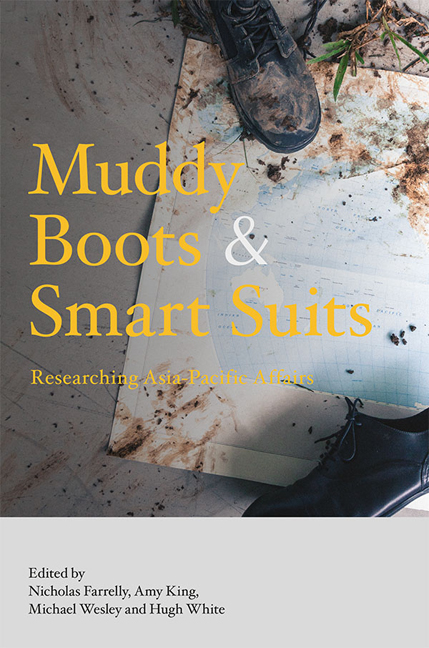Book contents
- Frontmatter
- Contents
- About the Contributors
- 1 Introduction to Research in Asia-Pacific Affairs
- Section I In the Field
- 2 Studying Policy from the Ground Up: The Solomon Islands Case
- 3 Reflections on Political Cultures in Thought and Action
- 4 Human Considerations in Conflicted Societies
- Section II Analysing Politics
- Section III Shaping a Region
- Section IV Conflict and Order
- Section V Policy and Practice
- Bibliography
- Index
2 - Studying Policy from the Ground Up: The Solomon Islands Case
from Section I - In the Field
Published online by Cambridge University Press: 12 January 2018
- Frontmatter
- Contents
- About the Contributors
- 1 Introduction to Research in Asia-Pacific Affairs
- Section I In the Field
- 2 Studying Policy from the Ground Up: The Solomon Islands Case
- 3 Reflections on Political Cultures in Thought and Action
- 4 Human Considerations in Conflicted Societies
- Section II Analysing Politics
- Section III Shaping a Region
- Section IV Conflict and Order
- Section V Policy and Practice
- Bibliography
- Index
Summary
INTRODUCTION
This chapter considers the relationship between country-level or groundup research, policy, and policymaking. It focuses on the interface between research and policy issues — that is to say, how policy can be the subject of research and the role research can play in informing policy — using the experience of the Regional Assistance Mission to Solomon Islands (RAMSI) as a case study. RAMSI is a regionally mandated but Australian-led statebuilding mission developed in response to civil conflict in the Solomon Islands (Braithwaite et al. 2010). Arriving in Solomon Islands in 2003, RAMSI involved a large-scale policing component and an ambitious development programme focused on rebuilding the post-conflict Solomon Islands state. Conceived in a global “state-building moment” (Allen and Dinnen 2016), when international enthusiasm for external intervention was at its fullest flush, RAMSI was a major Australian security and development policy initiative with regional and international significance (Fry and Kabutaulaka 2008). Today, overt references to state-building have receded from Australia's policy lexicon but state-building remains central to its regional security and development policy including as an implicit part of good governance and institutional strengthening programmes across the Asia-Pacific region. With a reputation as one of the most successful state-building interventions from the period (Fullilove 2006), RAMSI has been the object of significant research interest amongst transnational research and policy communities. At the same time, as a complex and long-term mission, RAMSI has had to evolve and adapt, responding to a range of policy challenges over time. This has created demand amongst policymakers for policy-focused research to help explain and resolve policy problems and to identify new policy solutions.
Recognizing RAMSI as the focus of extensive country-level research, this chapter will explore how researchers have responded to and engaged with policy issues from two different perspectives. The first involves RAMSI as the object of research, with the intervention providing an example of research of policy. From this perspective, the chapter will consider how country-level research of RAMSI has contributed to broader scholarly debates on state-building and intervention, which has been a major debate in world politics and international relations in the twenty-first century.
- Type
- Chapter
- Information
- Muddy Boots and Smart SuitsResearching Asia-Pacific Affairs, pp. 13 - 27Publisher: ISEAS–Yusof Ishak InstitutePrint publication year: 2017

